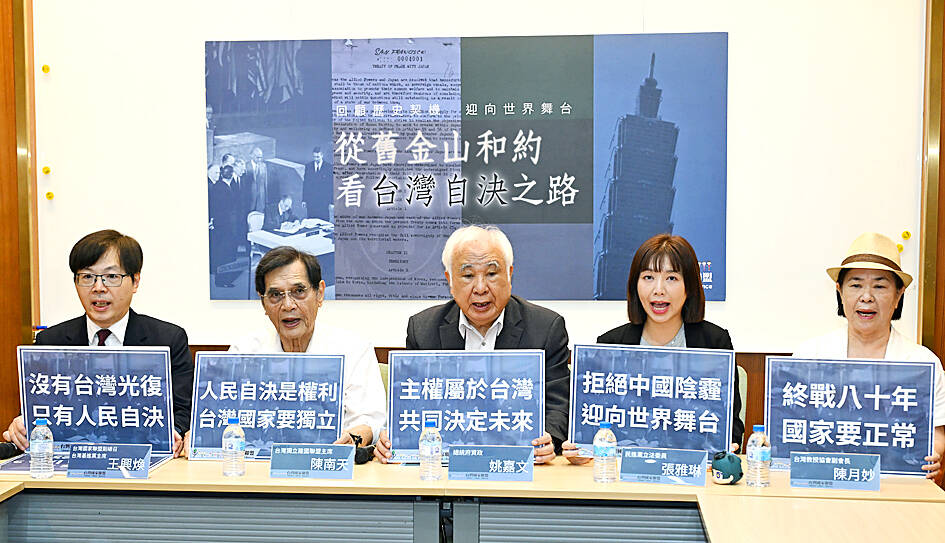The Treaty of San Francisco should be taught at schools to correct the historical record on Taiwan’s legal status following the end of World War II, senior presidential adviser Yao Chia-wen (姚嘉文) said on Friday.
He made the remarks at a news conference hosted by Democratic Progressive Party Legislator Ngalim Tiunn (張雅琳), the Taiwan Association of University Professors and the Taiwan Statebuilding Party.
The treaty signed in 1951 ended the Allied occupation of Japan and Japanese territorial claims over Taiwan and Penghu, whose status was to be determined at a later time according to principles of self-determination.

Photo: Liao Chen-huei, Taipei Times
The Treaty of San Francisco should be taught as a pivotal legal document defining the legal status of Taiwan and its outlying islands, Yao said.
However, the nation’s education has long emphasized the 1943 Cairo Declaration and the 1945 Potsdam Declaration, he said.
The Cairo Declaration outlined the WWII Allies’ contention that, after the Japanese surrender, territory that Japan had “stolen” from China — including Taiwan and Penghu — should be returned to China.
The Chinese Nationalist Party (KMT) has long claimed that this and the Potsdam Declaration gave China the right to resume sovereignty over Taiwan and Penghu. It argues the Cairo Declaration is a legal document that establishes the Republic of China’s (ROC) claim.
The preferential historical treatment of two declarations at the expense of the more legally significant treaty reflected the orthodoxy of the KMT, which sought to legitimize its rule over Taiwan, Yao said.
The narrative of Taiwan’s supposed liberation by KMT troops and Taiwan’s celebration of Double Ten National Day marking the anniversary of the ROC’s founding on Oct. 10, 1911, has no basis in fact or international law, Yao said.
The historiography surrounding the Cairo Declaration perpetuated by the KMT was a smokescreen for its illegal occupation and repression of Taiwan, World United Formosans for Independence chairman Richard Chen (陳南天) said.
Taiwan Association of University Professors deputy chairperson Chen Yue-miao (陳月妙) said the unconditional surrender of Japan in 1945 did not constitute a transfer of the right to govern Taiwan from Japan to the ROC.
The “retrocession” of Taiwan to China was a myth created and reinforced by the KMT during the White Terror period, he added.
Taiwan’s undefined legal status under the Treaty of San Francisco means that Taiwanese have the sole right to decide the nation’s future, Union of Taiwanese Teachers vice president Pan Wei-you (潘威佑) said.
Taiwan Statebuilding Party Chairman Wang Hsin-huan (王興煥) said that the treaty, being a later and formal agreement, superseded the Cairo Declaration under recognized principles of international law.
The narrative surrounding WWII and Taiwan’s retrocession to China should be abrogated in favor of a more factually accurate history that emphasizes Taiwanese autonomy, he said.

Three batches of banana sauce imported from the Philippines were intercepted at the border after they were found to contain the banned industrial dye Orange G, the Food and Drug Administration (FDA) said yesterday. From today through Sept. 2 next year, all seasoning sauces from the Philippines are to be subject to the FDA’s strictest border inspection, meaning 100 percent testing for illegal dyes before entry is allowed, it said in a statement. Orange G is an industrial coloring agent that is not permitted for food use in Taiwan or internationally, said Cheng Wei-chih (鄭維智), head of the FDA’s Northern Center for

LOOKING NORTH: The base would enhance the military’s awareness of activities in the Bashi Channel, which China Coast Guard ships have been frequenting, an expert said The Philippine Navy on Thursday last week inaugurated a forward operating base in the country’s northern most province of Batanes, which at 185km from Taiwan would be strategically important in a military conflict in the Taiwan Strait. The Philippine Daily Inquirer quoted Northern Luzon Command Commander Lieutenant General Fernyl Buca as saying that the base in Mahatao would bolster the country’s northern defenses and response capabilities. The base is also a response to the “irregular presence this month of armed” of China Coast Guard vessels frequenting the Bashi Channel in the Luzon Strait just south of Taiwan, the paper reported, citing a

The Chinese military has built landing bridge ships designed to expand its amphibious options for a potential assault on Taiwan, but their combat effectiveness is limited due to their high vulnerability, a defense expert said in an analysis published on Monday. Shen Ming-shih (沈明室), a research fellow at the Institute for National Defense and Security Research, said that the deployment of such vessels as part of the Chinese People’s Liberation Army (PLA) Navy’s East Sea Fleet signals a strong focus on Taiwan. However, the ships are highly vulnerable to precision strikes, which means they could be destroyed before they achieve their intended

UNDER PRESSURE: The report cited numerous events that have happened this year to show increased coercion from China, such as military drills and legal threats The Chinese Communist Party (CCP) aims to reinforce its “one China” principle and the idea that Taiwan belongs to the People’s Republic of China by hosting celebratory events this year for the 80th anniversary of the end of World War II, the “retrocession” of Taiwan and the establishment of the UN, the Mainland Affairs Council (MAC) said in its latest report to the Legislative Yuan. Taking advantage of the significant anniversaries, Chinese officials are attempting to assert China’s sovereignty over Taiwan through interviews with international news media and cross-strait exchange events, the report said. Beijing intends to reinforce its “one China” principle